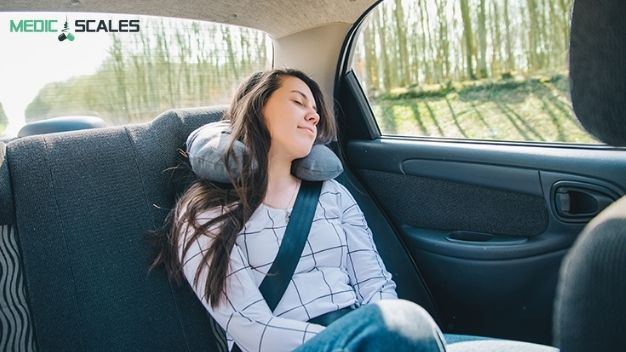Traveling is among life’s most enjoyable experiences for many. Others find it an integral part of their work. Whatever your reasons for traveling, having enough sleep is essential to well-being and helps you maximize the enjoyment of every vacation.
Despite the importance of sleeping well, it’s not uncommon to experience sleep issues during travel. Sleeping poorly on vacation is a result of various circumstances, but there are concrete ways to help you sleep better traveling and for all the time of your trip.
What is the impact of travel on the work you do?
It can be a challenge for those who are traveling for work. There are many issues that could arise when you work following a trip.
If you know someone who has anxiety or fear of the smallest transport like helicopters, flights, or others, they may have a specific fear of transport. These fears result in sleep disturbances and make it difficult to fall asleep. The following day, they are tired and exhausted throughout the day. They also feel unproductive at work.
Modalert 200 and Modvigil 200 can be helpful by helping you stay alert and active during the day. Users of the Smart Pill can feel more focused at work, be more focused, and enhance their brain capabilities. The Waklert 150 and Artvigil 150 are also good choices as they can help you combat excessive sleepiness during the day.
What causes sleep disruption If You Travel?
Although travel can bring fascinating and exciting experiences, it also can be a source of frustration. Many travelers find it difficult to fall asleep while traveling, which makes it difficult to appreciate the trip fully.
Fatigue from traveling
Traveling can trigger emotional and physical exhaustion that results in fatigue from travel. Stress, headaches, sleep loss, and all sorts of discomfort are all indications of stress caused by travel.
Tiredness during travel could be caused by a myriad of causes:
- Fear of flying, or other types of transport.
- The fear of issues that could be triggered during a trip.
- The process of packing, arriving on time, and other logistical stress
- Motion sickness problem
- The long days of travel.
- There are interruptions or delays within the schedule.
- Sleeping problems while traveling, for example, in a train, plane, or even in a car when standing up.
- Constipation, constipation, and dehydration as well as respiratory tract infection could all be caused when you fly in a cabin with pressurization.
- The changes in food and drink consumption when traveling, which include an increase in alcohol consumption and caffeine consumption.
- Long periods of time can cause leg inflammation, stiffness, and decrease physical movement.
The symptoms of travel weariness can occur at any moment and for any reason and it can also aggravate existing health issues.
Jet lag
Traveling long distances that traverse 3 or more time zones may cause jet lag. This is a condition that causes sleep for a brief period of time. The time of the person’s circadian rhythm is still rooted in the time zone they live in upon arrival, resulting in an unbalanced alignment to the time zone of their destination.
Inability to sleep is a typical sign that is a result of jet lag. Affected mental or physical performance fatigue, daytime sleepiness, digestive problems as well as general fatigue are just a few of the other signs.
Jet lag typically lasts for only a few days, however, it could last for several weeks before the circadian rhythm adapts to the local time. If you’re flying east and crossing multiple different time zones, jet lag is generally more than usual.
Changes to the Schedule
Even if one’s cycle isn’t affected due to jet lag, adjustments to their daily routine particularly their bedtime can cause sleep issues. It can be harder to get to sleep or stay asleep throughout the night if your sleeping routine is disturbed.
It’s common for people to want to fit as much as they can into their busy schedules particularly on business and vacations. This could lead to excessive stimulation and/or a lack of time for sleep.
In uncomfortable or new places
There is a tendency for people to be more sleepy the first night in a different location, as evidenced by studies. “The “first-night impact” was first noticed in the sleep clinics where researchers found the same pattern.
The effect is all-encompassing, not just within sleep centers. Other studies show that even in a tranquil setting like a spa resort, first-night sleeping quality was lower. According to some researchers, it is an evolutionary way of keeping the brain’s specialized area active while sleeping in a new location.
While traveling, the likelihood of sleeping improves the second night, but that isn’t always the situation. It is possible to struggle to rest uninterrupted when the accommodation you stay in has a bad mattress or lots of ambient light or sound.
Fitness Routine and Diet Changes
It is often viewed as a refreshing break from the daily grind, however, interruptions to sleep can be caused due to changes in established patterns of sleep.
Travelers might be enticed to drink more alcohol or eat bigger meals than they normally do as both could affect sleeping routines. When traveling, you should exercise regularly to aid in sleeping better, which may be slowed or modified.
For More Products:- Modafresh 200 | Modaheal 200 | Vilafinil 200
It’s the bottom line
Being aware of your sleeping habits while traveling isn’t simple in any way. It is essential to know the right steps to have a great performance at work and not disrupt your work with travel.

